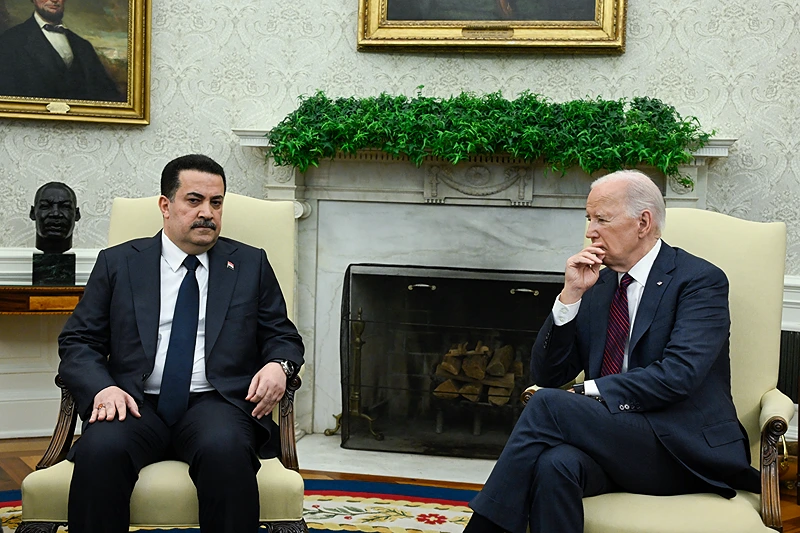
OAN’s Brooke Mallory
11:12 AM – Monday, April 15, 2024
On Monday, President Joe Biden will have a meeting with Iraqi Prime Minister Mohammed Shia al-Sudani at the White House. The meeting comes as the future of U.S. soldiers in Iraq is uncertain and as tensions in the Middle East are rising, leading to the resurgence of the Islamic extremist group ISIS.
According to a senior State Department official, al-Sudani and Biden will discuss “more cooperative” areas, including energy security, in addition to private sector and economic investment in Iraq, which is a priority for Baghdad.
However, a significant portion of the conversation will center on the future of the 2,500 American soldiers currently stationed in Iraq. Discussions over whether those troops are still required to combat ISIS are underway between the United States and Iraq.
“It is not the primary focus of the visit,” the State Department official said in a call with reporters, referring to the troops. “But it is almost certainly going to come up.”
The leaders’ summit, which is taking place at a highly critical moment in the Middle East and has strained relations between the U.S. and Iraq, will be widely monitored when Biden meets with al-Sudani.
Meanwhile, Israel is still fighting Hamas, a Palestinian Islamic terrorist organization, in Gaza, where the conflict has claimed more than 33,000 lives in more than six months. The battle has led to a regional escalation in hostilities between Israeli and Iranian-backed proxies and US soldiers.
Additionally, in the Red Sea, where they are engaged in combat with U.S. forces guarding the trade route, the Houthi rebels in Yemen continue to undertake frequent attacks on cargo ships.
A few months ago, the final proxy organizations in Iraq and Syria supported by Iran attacked a U.S. base, making Iraq another front in the regional struggle. Since the fatal U.S. retaliation strikes in February, the militia groups backed by Iran have stopped their attacks.
Nevertheless, both Iran and the United States were criticized by al-Sudani and Iraqi leaders for exploiting their country as a front in the proxy conflict.
Whether or not the trained Iraqi security forces are now capable of repelling the threat posed by ISIS is at the center of the ongoing negotiations between Washington and Baghdad on the future of U.S. soldiers.
After losing significant portions of land in both Syria and Iraq between 2014 and 2017, ISIS is still mostly weakened.
However, the denounced extremist organization ISIS-K’s offshoot in Afghanistan has reappeared, striking and murdering dozens of people in both Iran and Russia this year. The attack at Kabul airport in 2021, which claimed the lives of thirteen U.S. service members amidst the disorganized U.S. pullout from Afghanistan, was likewise carried out by ISIS-K.
In an editorial piece published in Foreign Affairs magazine, al-Sudani stated that parties involved in the current negotiations have decided to gradually remove the international coalition, and a plan of action for doing so is now being discussed.
He said that since the threat posed by ISIS has decreased, the United States and Iraq require a “new phase of partnership, based on cooperation that goes beyond just security and military affairs.”
“Little by little, as security and stability are restored, the need for weapons outside the control of the state and its institutions will disappear. We are working concertedly toward that end,” Al-Sudani wrote, demanding greater U.S.-Iraq cooperation on economy, diplomacy, and technology.
“We approach every country on equal terms, so that Iraq does not become an arena for any outside actor to settle scores,” he wrote. “Iraq must be dealt with on the basis of sovereignty and mutual respect, not as a proxy for other conflicts,” he continued.
Meanwhile, a captive held in Iraq by a militia supported by Iran is another likely topic of discussion. Prior to the meeting with al-Sudani, Rep. Mike Waltz (R-Fla.) wrote to Biden, voicing concerns about the Iraqi government’s tight ties to militias backed by Iran, such as Kataib Hezbollah, according to Politico.
Waltz put pressure on Biden to “condition the meeting” between him and al-Sudani on the Iraqi leader, pressuring Kataib Hezbollah to free a kidnapped Russian-Israeli doctorate student living in the United States, Elizabeth Tsurkov. She was arrested while visiting Baghdad and has been jailed since March 2023.
Social media users chimed in with their own thoughts after White House National Security Communications Advisor John Kirby’s Fox News interview was posted.
Stay informed! Receive breaking news blasts directly to your inbox for free. Subscribe here. https://www.oann.com/alerts

